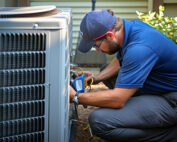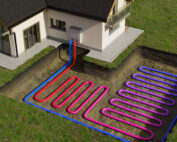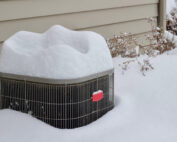Geothermal HVAC systems are gaining popularity as a sustainable alternative to traditional heating and cooling solutions. These systems use the Earth’s consistent underground temperature to regulate indoor environments efficiently. By harnessing renewable energy from the ground, geothermal systems minimize environmental impact while reducing energy costs. But how do geothermal HVAC systems work? Understanding their components and functionality can help homeowners decide if this technology aligns with their goals.
The Basics of Geothermal HVAC Systems
At the core of a geothermal HVAC system lies the principle of heat exchange. Unlike conventional systems that rely on outside air, geothermal systems utilize the stable temperatures beneath the Earth’s surface. Depending on the location, underground temperatures typically remain between 45°F and 75°F year-round. This consistency allows geothermal systems to operate efficiently regardless of outdoor weather conditions.
The main components of a geothermal HVAC system include:
- Ground Loops: These are pipes buried underground, filled with a fluid that absorbs or dissipates heat.
- Heat Pump: This device transfers heat between the ground loops and your home.
- Ductwork or Radiant Systems: These distribute conditioned air or heat throughout the home.
How the System Works in Heating Mode
In colder months, geothermal systems extract heat from the ground. The fluid in the ground loops absorbs thermal energy from the Earth. This fluid then travels to the heat pump, which compresses the heat, increasing its temperature. The heat is distributed through your home via ductwork or radiant flooring systems, ensuring a cozy indoor environment.
Cooling Mode: Reverse Heat Exchange
During warmer months, geothermal systems work in reverse. Instead of pulling heat from the Earth, the system extracts heat from your home. The heat pump transfers the heat to the ground loops, where it dissipates into the cooler Earth. This process ensures your home stays cool and comfortable without the need for energy-intensive air conditioning units.
Closed-Loop vs. Open-Loop Systems
Geothermal HVAC systems are available in two main configurations:
- Closed-Loop Systems: These systems circulate the same fluid through a sealed pipe network. Horizontal or vertical loops are used depending on the available space.
- Open-Loop Systems: These systems use water from a natural source, such as a well or pond, as the heat exchange medium.
Both options have unique benefits and are chosen based on the property’s layout and resources.
The Benefits of Geothermal HVAC Systems
Although geothermal HVAC systems might not be offered by Will Air, LLC, it’s worth exploring their advantages for those interested in sustainable solutions. Key benefits include:
- Energy Efficiency: Geothermal systems can reduce energy consumption by up to 50% compared to traditional systems.
- Longevity: Ground loops can last 50 years or more, while heat pumps typically last 20-25 years.
- Eco-Friendliness: These systems significantly lower greenhouse gas emissions by using renewable energy.
- Lower Operating Costs: Although the upfront installation cost is high, long-term energy savings make geothermal systems cost-effective.
Geothermal HVAC: Challenges to Consider
Despite the benefits, geothermal systems are not ideal for every property. Installation requires significant upfront investment and enough land for ground loop placement. In addition, not all HVAC professionals have experience installing or maintaining geothermal systems, making it essential to choose a knowledgeable provider.
Alternatives for Energy-Efficient HVAC Solutions
If geothermal isn’t feasible, there are other energy-efficient HVAC options worth exploring. Will Air, LLC specializes in a wide range of HVAC services tailored to Maryland homeowners. From high-efficiency heat pumps to smart thermostats, there’s a solution for every budget and home size. Always remember, where there’s a Will, there’s a Way!
Will Air, LLC focuses on providing reliable, personalized HVAC services to meet diverse needs. Whether you’re upgrading your system, exploring maintenance options, or simply seeking advice, our experienced team is here to help. While geothermal may not be part of our offerings, we can guide you toward the best solution for your home.
Is Geothermal Right for You?
Deciding whether a geothermal HVAC system is right for your home involves evaluating installation costs, property size, and energy goals. While geothermal systems excel in energy efficiency and sustainability, they may not suit every situation.
For homeowners in Maryland considering their HVAC options, contacting a trusted local provider like Will Air, LLC is an excellent first step. Our team can explain the pros and cons of various systems, ensuring you make an informed decision. If geothermal isn’t the right fit, Will Air, LLC can recommend other energy-efficient solutions to optimize your home’s comfort and efficiency.
For professional guidance and top-tier HVAC services, Will Air, LLC is your trusted partner. Contact us today at 410-549-9300 to discuss your heating and cooling needs.
Hot Topics
Recent Posts
What Is Duct Cleaning and Why Do You Need It?
When was the last time you had your air ducts cleaned? If you can’t remember—or [...]
Top Maintenance Tips to Save Energy This Winter
As temperatures drop, homeowners and businesses rely heavily on their heating systems to stay comfortable. [...]
How Do Geothermal HVAC Systems Work?
Geothermal HVAC systems are gaining popularity as a sustainable alternative to traditional heating and cooling [...]
Maintain HVAC Efficiency During Extreme Weather
Extreme weather can challenge your HVAC system, pushing it to work harder than usual. Knowing [...]







